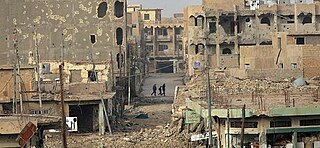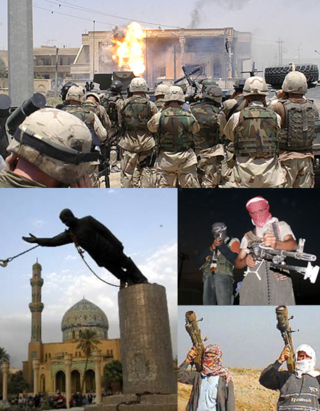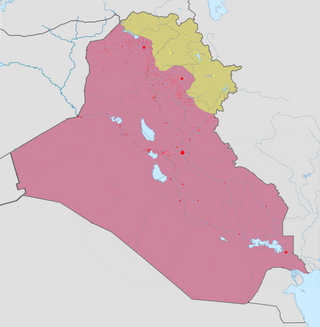Related Research Articles

Iraq Body Count project (IBC) is a web-based effort to record civilian deaths resulting from the US-led 2003 invasion of Iraq. Included are deaths attributable to coalition and insurgent military action, sectarian violence and criminal violence, which refers to excess civilian deaths caused by criminal action resulting from the breakdown in law and order which followed the coalition invasion. As of February 2019, the IBC has recorded 183,249 – 205,785 civilian deaths. The IBC has a media-centered approach to counting and documenting the deaths. Other sources have provided differing estimates of deaths, some much higher. See Casualties of the Iraq War.

Estimates of the casualties from the Iraq War have come in several forms, and those estimates of different types of Iraq War casualties vary greatly.

The Lancet, one of the oldest scientific medical journals in the world, published two peer-reviewed studies on the effect of the 2003 invasion of Iraq and subsequent occupation on the Iraqi mortality rate. The first was published in 2004; the second in 2006. The studies estimate the number of excess deaths caused by the occupation, both direct and indirect.

The Iraqi civil war was a civil war fought mainly between the Iraqi government along with American-led coalition forces and various sectarian armed groups, mainly Islamic State of Iraq and the Mahdi Army, from 2006 to 2008. In February 2006, the anti-American insurgency escalated into a sectarian civil war after the bombing of Al-Askari shrine, considered as a holy site in Twelver Shi'ism. US President George W. Bush and Iraqi officials accused Al-Qaeda in Iraq of orchestrating the bombing, although AQI publicly rejected any links to the attacks. The incident set off a wave of reprisals by Shia militants on Sunni civilians, followed by Sunni counterattacks on Shia civilians.

The Iraq War was a protracted armed conflict in Iraq from 2003 to 2011. It began with the invasion of Iraq by the United States-led coalition that overthrew the Ba'athist government of Saddam Hussein. The conflict continued for much of the next decade as an insurgency emerged to oppose the coalition forces and the post-invasion Iraqi government. US troops were officially withdrawn in 2011. The United States became re-involved in 2014 at the head of a new coalition, and the insurgency and many dimensions of the armed conflict are ongoing. The invasion occurred as part of the George W. Bush administration's war on terror following the September 11 attacks.
Les Roberts is an American epidemiologist. He was the first winner of the Centers for Disease Control's Paul C. Schnitker Award for contributions to global health. He became prominent in the news just before the 2004 U.S. presidential election for his study estimating that 100,000 Iraqi civilians had been killed in the Iraq war at a time when official U.S. government counts were much lower. When a 2006 follow-up study confirmed the report, U.S. President George W. Bush dismissed it, saying the approach had been "pretty well discredited", without explaining how.
The 3 February 2007 Baghdad market bombing was the detonation of a large truck bomb in a busy market in the Iraqi capital of Baghdad on 3 February 2007. The suicide attack killed at least 135 people and injured 339 others. The bomb, estimated to be about one ton in weight, brought down at least 10 buildings and coffee shops and obliterated market stalls in a largely Shi‘ite enclave less than a half-mile from the Tigris River.

Operation Imposing Law, also known as Operation Law and Order, Operation Fardh al-Qanoon or Baghdad Security Plan (BSP), was a joint Coalition-Iraqi security plan conducted throughout Baghdad. Under the Surge plan developed in late 2006, Baghdad was to be divided into nine zones, with Iraqi and American soldiers working side by side to clear each sector of Shiite militias and Sunni insurgents and establish Joint Security Stations so that reconstruction programs could begin in safety. The U.S. military commander in Iraq, David Petraeus, went so far as to say Iraq would be "doomed" if this plan failed. Numerous members of Congress stated the plan was a critical period for the U.S. presence in Iraq.
Ali al-Shemari is an Iraqi politician from the Sadrist Movement who was the Health Minister of Iraq from May 20, 2006, until April 16, 2007.

The emerging field of conflict epidemiology offers a more accurate method to measure deaths caused during violent conflicts or wars that can generate more reliable numbers than before to guide decision-makers.
On Friday, 14 September 2007, ORB International, an independent polling agency located in London, published estimates of the total war casualties in Iraq since the US-led invasion of Iraq in 2003. At over 1.2 million deaths (1,220,580), this estimate is the highest number published so far. From the poll margin of error of +/-2.5% ORB calculated a range of 733,158 to 1,446,063 deaths. The ORB estimate was performed by a random survey of 1,720 adults aged 18+, out of which 1,499 responded, in fifteen of the eighteen governorates within Iraq, between August 12 and August 19, 2007. In comparison, the 2006 Lancet survey suggested almost half this number through the end of June 2006. The Lancet authors calculated a range of 392,979 to 942,636 deaths.

Events in the year 2008 in Iraq.
On January 9, 2008 the World Health Organization reported the results of the "Iraq Family Health Survey" published in the New England Journal of Medicine. The study surveyed 9,345 households across Iraq and was carried out in 2006 and 2007. It estimated 151,000 deaths due to violence from March 2003 through June 2006.

March 19, 2008, being the fifth anniversary of the United States 2003 invasion of Iraq and in protest and demonstration in opposition to the war in Iraq, anti-war protests were held throughout the world including a series of autonomous actions in the United States' capitol, Washington, D.C., in London, Sydney, Australia, and the Scottish city of Glasgow with the latter three being organized by the UK-based Stop the War Coalition. Actions included demonstrations at government buildings and landmarks, protests at military installations and student-led street blockades. The protests were notable, in part, for mostly replacing mass marches with civil disobedience – including religious-focused protests – and for utilizing new technologies to both coordinate actions and interface with traditional print and broadcast media.
The Iraq War resulted in multiple humanitarian crises.
The Iraq War documents leak is the disclosure to WikiLeaks of 391,832 United States Army field reports, also called the Iraq War Logs, of the Iraq War from 2004 to 2009 and published on the Internet on 22 October 2010. The files record 66,081 civilian deaths out of 109,000 recorded deaths. The leak resulted in the Iraq Body Count project adding 15,000 civilian deaths to their count, bringing their total to over 150,000, with roughly 80% of those civilians. It is the biggest leak in the military history of the United States, surpassing the Afghan War documents leak of 25 July 2010.

The Iraqi conflict refers to a near-continuous series of events that began with the 2003 invasion of Iraq, which led to the fall of erstwhile Iraqi president Saddam Hussein. During the Iraq War, the Multi-National Force (MNF–I) of the United States helped to establish a Shia-dominated federal government under Iraqi politician Nouri al-Maliki. Around this time, the Iraqi insurgency had emerged with a predominant focus on fighting the occupying MNF–I troops and the new Iraqi government. However, the insurgency also involved inter-Iraqi sectarian violence, primarily between Shias and Sunnis. In 2011, the MNF–I withdrew from Iraq, leading to renewed sectarian violence from 2011 to 2013. During this period, the Islamic State (IS) emerged, triggering a a renewed war and an American-led intervention in 2014. In 2017, full-scale fighting in the country came to a close after the Islamic State was defeated by the Iraqi government and its allies, but a low-level IS insurgency remains ongoing in the rural northern parts of the country.

Casualty recording is the systematic and continuous process of documenting individual direct deaths from armed conflict or widespread violence. It aims to create a comprehensive account of all deaths within a determined scope, usually bound by time and location.
References
- ↑ Iraq Moves to Repeal Immunity for Guards, Washington Post , 2007-10-31, accessed on 2008-03-06
- ↑ SUNNI LEADERS CRITICIZE PARLIAMENT VOTE ON MINISTERS, Radio Free Europe , 2007-10-31, accessed on 2008-03-06
- ↑ The Military Health System Blog, Dr. Bruno Himmler, 2007-12-06, accessed on 2008-03-06
- ↑ Alkhuzai AH, Ahmad IJ, Hweel MJ, Ismail TW, et al. (2008). "Violence-Related Mortality in Iraq from 2002 to 2006" (PDF). New England Journal of Medicine . 358 (2): 484–93. doi:10.1056/NEJMsa0707782. PMID 18184950. S2CID 3186924. Archived from the original (PDF) on 2020-02-26. January 31, 2008. Supplementary Appendix provided by the authors:
- ↑ WHO country office in Iraq. Iraq Family Health Survey Archived 2008-06-11 at the Wayback Machine . World Health Organization (WHO).
- ↑ "New study says 151,000 Iraqi dead". January 10, 2008. BBC News Online.
- ↑ "151,000 civilians killed since Iraq invasion". By Sarah Boseley. January 10, 2008. The Guardian .
- ↑ "W.H.O. Says Iraq Civilian Death Toll Higher Than Cited". By Lawrence K. Altman and Richard A. Oppel Jr.. January 10, 2008. New York Times.
- ↑ "IRAQ: Civilian Deaths Massive by Any Measure" Archived 2008-12-06 at the Wayback Machine . By Haider Rizvi. January 11, 2008. Inter Press Service News Agency.
- ↑ "New study says 151,000 Iraqi dead". BBC News. January 10, 2008.
- ↑ "W.H.O. Says Iraq Civilian Death Toll Higher Than Cited" By Lawrence K. Altman and Richard A. Oppel Jr. January 10, 2008. The New York Times .